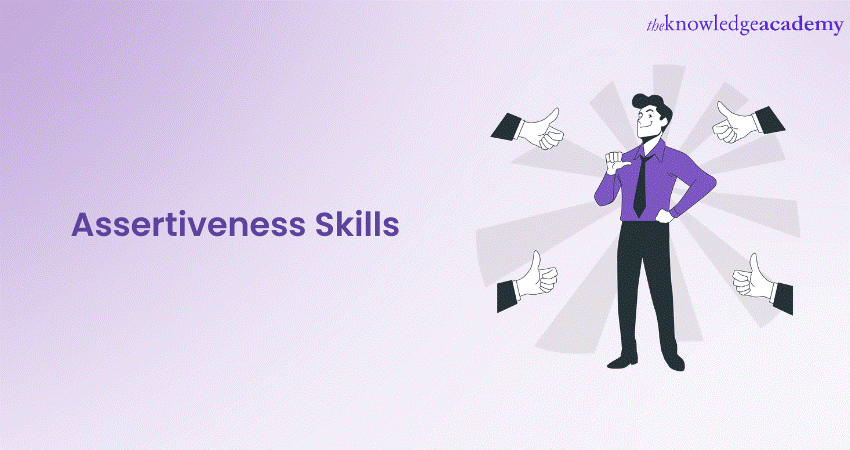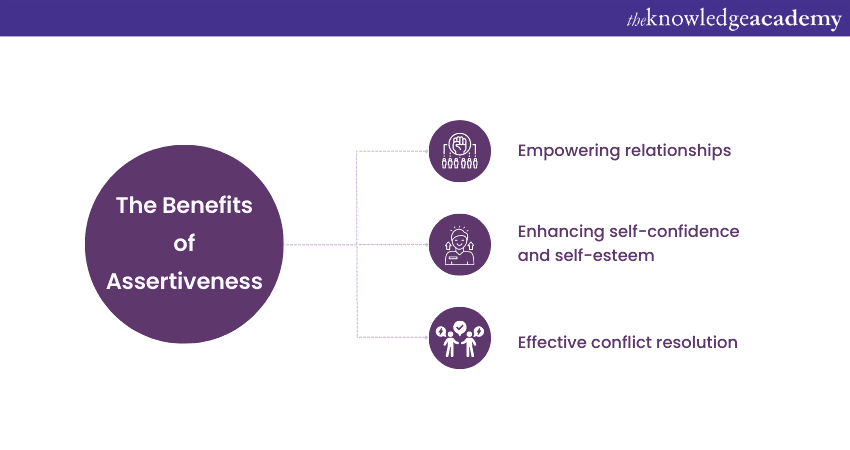We may not have the course you’re looking for. If you enquire or give us a call on +41 315281584 and speak to our training experts, we may still be able to help with your training requirements.
Training Outcomes Within Your Budget!
We ensure quality, budget-alignment, and timely delivery by our expert instructors.

Assertiveness Skills play a pivotal role in effective Communication, empowering individuals to express themselves. These skills allow you to speak confidently while respecting the rights of others. They allow you to share your opinions clearly and confidently, enhancing their influence and impact within the workplace.
If you wish to understand the features, benefits, and limitations of being Assertive, this blog is what you need. Read this blog to explore how Assertiveness Skills can enhance your self-esteem, allowing you to harness its power to build healthier relationships. Keep reading to learn more.
Table of Contents
1) What are Assertiveness Skills?
2) The benefits of being Assertive
3) Limitations of Assertiveness
4) How to develop Assertiveness Skills?
5) Conclusion
What are Assertiveness Skills?
Being Assertive can be described as a communication style that enables individuals to express their thoughts, feelings, and needs confidently and respectfully while also acknowledging the rights and perspectives of others. It is a middle ground between aggression and passivity, striking a balance between standing up for oneself and being considerate of others.
Unlike aggressive communication, which involves dominating and imposing ideas on others, and passive communication, which neglects one's own needs and feelings, being Assertive promotes effective and empathetic dialogue. The following are the skills required to become an Assertive individual:
1) Clear and direct expression: Assertive communication is marked by clarity and directness. Individuals who communicate assertively express their ideas and feelings openly without beating around the bush or resorting to vague language.
2) Respectful tone and body language: Maintaining a respectful tone and non-threatening body language is crucial in Assertive communication. It shows consideration for others' feelings and fosters a positive and receptive atmosphere.
3) Active listening: Assertive individuals not only express themselves effectively but also listen actively to others. This active listening demonstrates empathy and understanding, leading to more meaningful and constructive conversations.
4) Setting boundaries: One of the key features of Assertiveness is the ability to set and maintain healthy boundaries. Assertive individuals clearly communicate their limits, ensuring their needs and rights are respected.
5) Conflict resolution: Assertiveness is an essential tool in resolving conflicts. Instead of avoiding or escalating conflicts, Assertive individuals address them directly and respectfully. They seek win-win solutions that factor in the interests of all the involved parties.
The benefits of being Assertive
There are various . Being Assertive is a powerful Interpersonal Communication skill that offers numerous advantages, influencing various aspects of an individual's life positively. By embracing Assertiveness Skills, individuals can experience the following benefits:

Empowering relationships
Assertiveness plays a key role in cultivating healthy and meaningful relationships. When individuals communicate assertively, they express their thoughts, feelings, and needs openly and honestly. This promotes an atmosphere of trust and mutual support where both parties feel respected and valued. As a result, assertive individuals can engage in more authentic and fulfilling connections with others, leading to deeper and more meaningful relationships.
Enhancing self-confidence and self-esteem
Developing Assertiveness Skills has a direct impact on an individual's self-confidence and self-esteem. By asserting their rights and expressing themselves with clarity, Assertive individuals develop a greater sense of self-worth. This newfound self-assurance allows them to approach various situations with a positive mindset, enabling personal growth and a willingness to take on new challenges.
Effective conflict resolution
Assertiveness is a crucial tool in resolving conflicts constructively. When conflicts arise, Assertive individuals address them directly and respectfully. They are skilled at expressing their concerns and perspectives without resorting to aggression or manipulation. By actively listening to the other party and considering their interests,Assertive individuals seek win-win solutions that benefit all involved. This approach fosters a cooperative and understanding atmosphere, leading to more satisfactory resolutions
Learn to communicate effectively with our Effective Communication Skills Course!
Limitations of Assertiveness
While Assertiveness Skills are valuable for communication, it is essential to be aware of their potential limitations. Some of these limitations include:
Overuse and aggressiveness
One limitation of being Assertive arises when individuals overuse aggressive communication style, crossing the line into aggression. Assertiveness should never involve dominating others or disregarding their rights and feelings. When being Assertive becomes aggressive, it can lead to strained relationships, alienation, and conflicts. It is crucial for individuals to be mindful of their tone, body language, and approach to ensure that they remain Assertive, respectful and constructive.
Cultural and contextual considerations
A limitation of being Assertive lies in cultural norms and situational factors. Different cultures may have varying expectations regarding communication styles, with some cultures valuing Assertiveness more than others.
In certain situations, being overly Assertive may not be appropriate, particularly in cultures that emphasise collectivism and harmony. Individuals should adapt their communication style based on the cultural context to ensure effective and respectful interactions.
Learn how to put your thoughts assertively during negotiations – join our Assertiveness Skills - How and When to Be Assertive Course today!
How to develop Assertiveness Skills?
It is essential first to recognise any personal barriers that may be standing in the way of effective communication to become more Assertive. This requires a certain level of self-awareness, as it is necessary to identify and understand the root causes of these obstacles. By doing so, individuals can begin to work towards overcoming these barriers and develop more vital Assertiveness Skills. The following methods can be adopted to Develop Assertiveness Skills within yourself:
Assess your personal communication style
If you are looking to enhance your Assertiveness, it is essential to evaluate your current communication style. Take a moment to examine whether you are comfortable expressing yourself openly in your workplace and whether you give and receive feedback regularly. Identifying areas where you need to develop your Assertiveness Skills can help you practice and improve your confidence in situations where you need to be more Assertive.
Practise saying “no”
Setting boundaries and declining requests can be a daunting task, especially if you have a habit of accommodating others or sidestepping conflicts. It is vital to acquire the Skill of saying "no" when it is necessary. Begin by declining small requests and gradually increase your capacity to assert yourself. Remember that setting boundaries is a crucial aspect of self-care and helps to maintain healthy relationships.
Use “I” statements
When expressing thoughts and feelings, use "I" statements to assert yourself without blaming or accusing others. For example, say, "I feel..." instead of "You always..."
Express your needs clearly
When you want to express something, it is crucial to be crystal clear about what you intend to communicate and the reason behind it. Clearly state your requirements and anticipations, and politely ask for what you want straightforwardly and respectfully.
Practise active listening
Engage in active listening to understand others' perspectives and respond thoughtfully, promoting a respectful exchange of ideas.
Seek support
Seek support from friends, family, or professionals to gain encouragement and feedback as you develop Assertiveness Skills. This can help you analyse your progress and pain points.
Learn to speak your heart confidently with our Communication Skills Course !
Conclusion
Assertiveness Skills are valuable as they empower individuals to express themselves confidently while maintaining respect for others. By embracing their features, reaping their benefits, and acknowledging their limitations, you can cultivate healthier relationships, bolster self-esteem, and navigate conflicts with greater effectiveness. Being assertive is an ongoing journey that leads to personal growth and enhanced communication in all aspects of life.
Speak confidently to the masses with our Public Speaking Training Course!
Frequently Asked Questions
Upcoming Business Skills Resources Batches & Dates
Date
 Public Speaking Course
Public Speaking Course
Fri 28th Feb 2025
Fri 11th Apr 2025
Fri 27th Jun 2025
Fri 22nd Aug 2025
Fri 24th Oct 2025
Fri 28th Nov 2025







 Top Rated Course
Top Rated Course



 If you wish to make any changes to your course, please
If you wish to make any changes to your course, please


